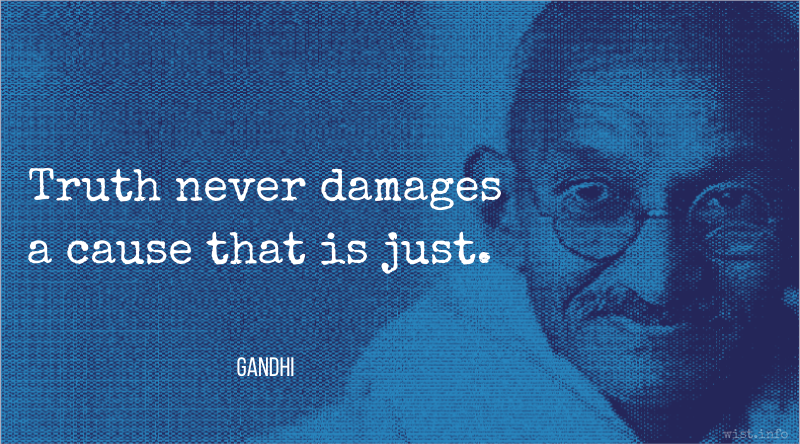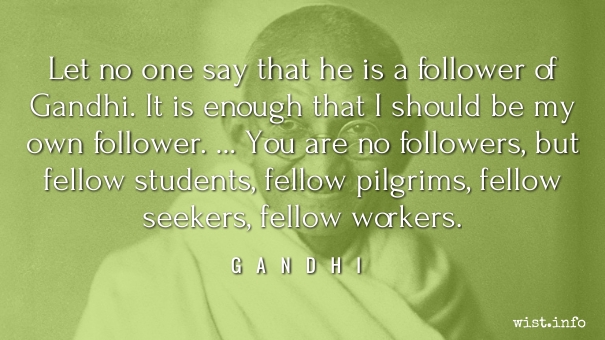Quotations by:
Gandhi, Mohandas
I have learnt through bitter experience the one supreme lesson to conserve my anger, and as heat conserved is transmuted into energy, even so our anger controlled can be transmuted into a power which can move the world.
Freedom is not worth having if it does not connote freedom to err. It passes my comprehension how human beings, be they ever so experienced and able, can delight in depriving other human beings of that precious right.
We must become the change we want to see.
Mohandas Gandhi (1869-1948) Indian philosopher and nationalist [Mahatma Gandhi]
(Attributed)
Variants:Almost always attributed to Gandhi, but not found in any of his published works. More discussion here.
- "Be the change you wish to see in the world."
- "You must be the change you wish to see in the world."
My non-violence does not admit of running away from danger and leaving dear ones unprotected. Between violence and cowardly flight, I can only prefer violence to cowardice. I can no more preach non-violence to a coward than I can tempt a blind man to enjoy healthy scenes. … Nonviolence is infinitely superior to violence. But the message of nonviolence is for those who know how to die, not for those who are afraid of death. If one has not that courage, I want him to cultivate the art of killing and being killed, rather than in a cowardly manner to flee from danger.
I have only three enemies. My favorite enemy, the one most easily influenced for the better, is the British Empire. My second enemy, the Indian people, is far more difficult. But my most formidable opponent is a man named Mohandas K. Gandhi. With him I seem to have very little influence.
Keep your thoughts positive because your thoughts become your words.
Keep your words positive because your words become your behavior.
Keep your behavior positive because your behavior becomes your habits.
Keep your habits positive because your habits become your values.
Keep your values positive because your values become your destiny.
Civility does not here mean the mere outward gentleness of speech cultivated for the occasion, but an inborn gentleness and desire to do the opponent good.
Mohandas Gandhi (1869-1948) Indian philosopher and nationalist [Mahatma Gandhi]
Autobiography : The Story of My Experiments with Truth>, ch. 24 (1927)
(Source)
I love those who never preach but live the life according to their lights. Their lives are silent, yet most effective, testimonies. Therefore I cannot say what to preach, but I can say that a life of service and uttermost simplicity is the best preaching. A rose does not need to preach. It simply spreads its fragrance. The fragrance is its own sermon. If it had human understanding and if it could engage a number of preachers, the preachers would not be able to sell more rose than the fragrance itself could do. The fragrance of religious and spiritual life is much finer and subtler than that of the rose.
Mohandas Gandhi (1869-1948) Indian philosopher and nationalist [Mahatma Gandhi]
Harijan (29 Mar 1935)
Full text.
I will give you a talisman. Whenever you are in doubt, or when the self becomes too much with you, apply the following test. Recall the face of the poorest and the weakest man whom you may have seen, and ask yourself, if the step you contemplate is going to be of any use to him. Will he gain anything by it? Will it restore him to a control over his own life and destiny? In other words, will it lead to swaraj [freedom] for the hungry and spiritually starving millions? Then you will find your doubts and your self melt away.
All progress is gained through mistakes and their rectification. No good comes fully fashoned, out of God’s hand, but has to be carved out through repeated experiments and repeated failures by ourselves. This is the law of individual growth. The same law controls social and political evolution also. The right to err, which means the freedom to try experiments, is the universal condition of all progress.
Truth never damages a cause that is just.
Mohandas Gandhi (1869-1948) Indian philosopher and nationalist [Mahatma Gandhi]
Non-Violence in Peace and War, Vol. 2 (1949)
(Source)
It ill becomes us to invoke in our daily prayers the blessings of God, the Compassionate, if we in turn will not practice elementary compassion towards our fellow creatures.
He who cannot protect himself or his nearest and dearest or their honor by non-violently facing death, may and ought to do so by violently dealing with the oppressor. He who can do neither of the two is a burden.
The golden rule of conduct, therefore, is mutual toleration, seeing that we will never all think alike and we shall see Truth in fragment and from different angles of vision. Conscience is not the same thing for all. Whilst, therefore, it is a good guide for individual conduct, imposition of that conduct upon all will be an insufferable interference with everybody’s freedom of conscience.
Mohandas Gandhi (1869-1948) Indian philosopher and nationalist [Mahatma Gandhi]
Young India (23 Sep 1926)
Full text.
Even as a tree has a single trunk but many branches and leaves, there is one religion —- human religion -— but any number of faiths.
Mohandas Gandhi (1869-1948) Indian philosopher and nationalist [Mahatma Gandhi]
Young India (Bulletin) (2 Oct 1930)
Some versions omit "-- human religion --". Full text.
The essence of true religious teaching is that one should serve and befriend all. … It is easy enough to be friendly with one’s friends. But to befriend the one who regards himself as your enemy is the quintessence of true religion. The other is mere business.
At the time of writing I never think of what I have said before. My aim is not to be consistent with my previous statements on a given question, but to be consistent with truth as it may present itself to me [at the] given moment. The result has been that I have grown from truth to truth.
If I seem to take part in politics, it is only because politics encircle us today like the coil of a snake from which one cannot get out, no matter how much one tries. I wish therefore to wrestle with the snake.
As the means, so the end.
Mohandas Gandhi (1869-1948) Indian philosopher and nationalist [Mahatma Gandhi]
In Young India (17 Jul 1924)
Compare to this.
Do not undertake anything beyond your capacity and at the same time do not harbor the wish to do less than you can. One who takes up tasks beyond his powers is proud and attached. On the other hand, one who does less than he can is a thief.
I have become disconsolate. In the secret of my heart I am in perpetual quarrel with God that He should allow such things to go on. My non-violence seems almost impotent. But the answer comes at teh end of the daily quarrel that neither God nor non-violence is impotent. Impotence is in men. I must try on without losing faith even though I break in the attempt.
All of your scholarship, all your study of Shakespeare and Wordsworth would be vain if at the same time you did not build your character and attain mastery over your thoughts and your actions.
Do not worry about what others are doing. Each of us should turn the searchlight inward and purify his or her own heart as much as possible.
Mohandas Gandhi (1869-1948) Indian philosopher and nationalist [Mahatma Gandhi]
Speech, All-India Radio (1948-01-16)
(Source)
Two weeks before his death. In Louis Fischer, The Life of Mahatma Gandhi, Part 3, ch. 9 "The Last Fast" (1957).
In my humble opinion, noncooperation with evil is as much a duty as is cooperation with good.
Mohandas Gandhi (1869-1948) Indian philosopher and nationalist [Mahatma Gandhi]
Statement at his sedition trial (1922-03-18)
(Source)
Following the riots in Chauri Chaura, India, on 5 February 1922, which killed 22 police officers, Gandhi was arrested for sedition for articles he'd written against the British government in India, in what is called the "Great Trial of 1922." After this statement he was sentenced to six years (serving two).
Gandhi had previously used the same phrase in "The Poet's Anxiety," Young India (1921-06-01), reprinted in Gandhi's Satyagraha, ch. 69 (1961).
(Note: searching out this quotation is complicated by the varied and evolving spellings of non-co-operation, non-cooperation, and noncooperation.)



